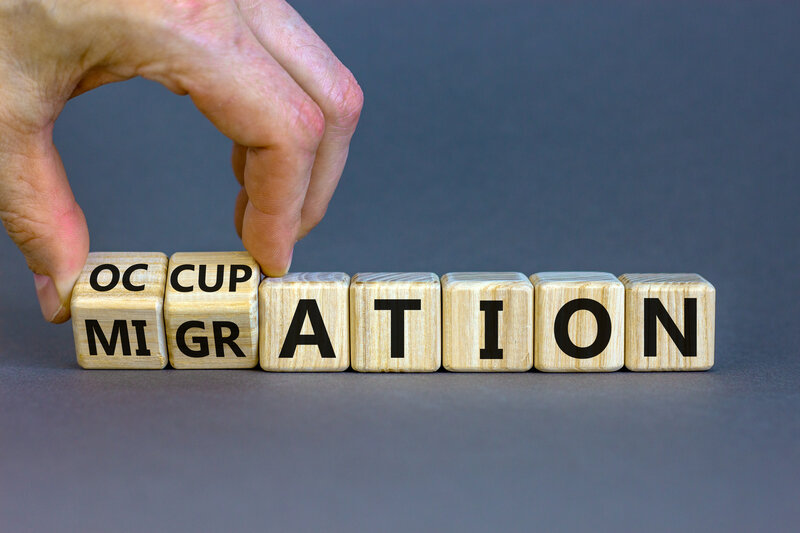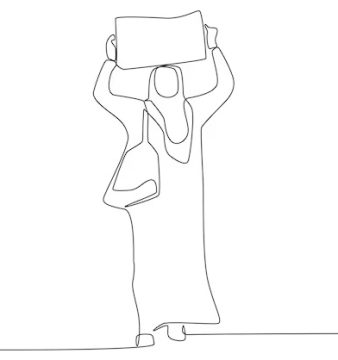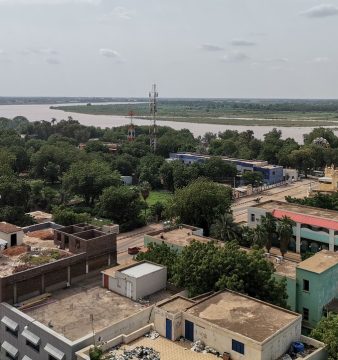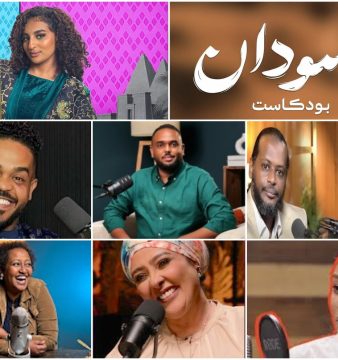The Crescendo of Migration Trauma Translates to Revolution

Writer Mohamed Khougali attempts to elucidate the link between migration politics and contemporary Sudanese revolutionary rap.
Following the nationwide protests and revolution in 2018, Sudan has seen a tsunami of rap artists fuel revolutionary sentiments, stoke controversy, and challenge norms. Anecdotally, it is easy to detect the over representation of Sudanese rap artists with Saudi Arabian migration. Researching the cause of this overrepresentation helps conceptualise current cultural phenomena in its appropriate historic context, perhaps to better inform understanding of social relations and cultural production. It is the author’s attempt to display, through rap music and migration policy, how intertwined Sudan and Saudi Arabia are, geospatial dynamics are complicated and important in understanding the reality of our political economy and sociology.
The word culture is convoluted. It has been utilised for different purposes and given varying significance across numerous disciplines. For example, anthropologist Marcel Mauss conceptualised culture as structures of refusal. ‘Societies live by borrowing from each other, but they define themselves rather by the refusal of borrowing than by its acceptance,’ he said. While Marxist political and culture theorist, Raymond Williams, describes culture as a ‘way of life’, encompassing wide social practices and social formations. As we are talking about introduction of revolutionary rap music to Sudan, the usage of the word culture will be more limited and can be interchanged for discourse.
Geopolitics and Migration
The coup of 1989 disrupted and changed the material experience of the Sudanese population in a dramatic way: the militarisation of civic spaces, the party loyal appointees, the arbitrary law and judgement, the collaboration with sectarian politics, the opportunistic foreign policy, the devastation of national production in favour of the finance sector, and more. This corrosive situation saw an exodus of political and economic migration out of Sudan, which continues to this day. This flow fluctuates based on migration policy of the countries favoured by Sudanese, and the political economic reality in Sudan.
Saudi Arabia hosts the most Sudanese migrants. In a 2011 study conducted by International Organisation of Migration (IOM) on migration patterns in Sudan, it was found that more than 50% of economic migrants made their way to Saudi Arabia. A study by the World Bank in 2005 suggests similar overrepresentations. The infamous Kafala system of migration management coupled with Saudi Arabia’s economic dependence on oil production and the slow diversification of the economy has meant migrants mostly work in low skilled labour jobs, followed by white collar and few in high skilled jobs. For Sudanese, the same 2011 study shows that 75% to 80% of Sudanese migrants work in low-skilled occupations.
Rentier State Theory (RST) has gained currency is many circles, including certain Leftists, to try and explain the political economy of the Gulf region countries. In superficial terms, these states seem to be at odds with certain conceptions of ‘developing’ nation-states with oil production being the main economy, the nationalisation of this economy and oligarchic political structure. The R in RST is to signify the fortuitous accident of having stumbled upon a rich supply of hydrocarbon product, which is exported and revenue is turned to the state (not private markets), which is ruled by monarchs. The problem with this theory is that it places these states in a heterodox category; as semi feudalistic with capitalist characteristic nation formations amid capitalist countries. Once this becomes the narrative, problems quickly ensue.
Once viewed under these terms, analysis starts to drift away from identifying these nations as capitalist to more obscure classifications: placing private markets, Western support of monarchies and colonialism as somehow removed. Of course, this is not the case. The current state structures of the Gulf is in large part due to British colonial and American imperial support. Looking at the private sector, dwarfed in contrast to state ownership according to RST, the world most valued IPO was recently introduced to the market, Saudi Aramco. The royal family of Qatar partly owns 80% of all stock market firms in Qatar. Mohammed bin Rashid Al Maktoum of Dubai hold stakes in the largest banks, construction firms and telecommunication. These are individual interests, not the states.
Looked at as capitalist states, we can now view the material reality of the migrant labourer and their relation to capital, focusing on Sudanese migrants.
Kafala Repression and Migration

The most powerful weapon in the capitalist arsenal in the class conflict, Kafala is a migration system forced on the overwhelming majority of migrants to Saudi Arabia. In essence, it allows an employer the categorical right to own the employee’s travel documents, and ensures absolute negotiating power of the employer and surveille employees under the pretext of ‘sponsorship’. This power imbalance between employee and employer encourages violence and abuse of all natures; sexual, political, social, psychological, etc.
Domestic workers acutely feel this exploitation, some of whom have resorted to cold razors and tight ropes to escape the absolute domination of their employers. Others have compared their situation to chattel slavery. Countless migrants have sustained hospitalising violence. Many workers were killed at the hands of their employers.
As can be attested to by the countless articles, research and anecdotal evidence, reality for Sudanese workers and their children, who suffer unrelenting racism (sometimes propagated in public spaces, media outlets, drama and talk shows, news outlets, etc) is anxiety inducing. The angst of capitalist exploitation simmers to a boil, but can never explode to a revolution, at least not for the working class.
In an effort to expedite economic diversification, Saudi Arabia began to encourage capital investments in place of cheap labour to grow the economy. It also promised reform to the Kafala system – it should be mentioned that promises of this nature have been made in the past, but not delivered. The reason for the urgency to restructure the economy is in part due to the 2014 oil price crash that revealed the vulnerability of complete oil dependency. The crash also brought to light the problem of unemployment during austerity, purposing quota hires for locals and attractive minimum wages for them. Other reforms include being able to leave your employer after a year’s employment with them and other minor suggestions. Enthusiasm must be tempered with the harsh contrast of the reality experienced by domestic workers, who enjoy no liberal reforms.
Introducing capital investments policies means discouraging lower-skilled worker migration, and encouraging high-skilled workers. This culminated in the 2017 dependent’s fee, increasing the fee for each dependent, which lead to the repatriation of working-class families. An exodus of 1.6 million workers was reported in July 2017 – 3,288 Sudanese returnees were reported months after the policy was issued, and the number rises significantly to this day.
Repression and Revolution
These are the material reality experience by the Sudanese migrant in Saudi Arabia, and their dependents. A reality that does not hold aggressors accountable lacks mediums of expressing indignation and social security. Sudanese dependents exposed to unchallenged racism, rife harassment, toxic masculine dominance, no social mobility and lack of rights.
It is the author’s opinion that the importation of American hegemony to Saudi Arabia brought with it rap music as a form of revolt cultural. The rap music scene in Saudi Arabia and in the Gulf countries in general was at one point very much popularised with the youth.
How could it not? There are parallels in lived realities between lower-class African Americans and lower-class African-Saudi-migrants. For African Americans, mass incarcerations, lack of social mobility, gentrification of social housing and of course, racism is the lived experience. For the latter, the Kafala system lacks social mobility and racism is the lived experience. Both forms of exploitation are sponsored by American hegemony. The exploitation of the African Americans by the state is well documented. The American imperial protection enjoyed by Saudi Arabia is well documented, from supplying weapons to military protection within the kingdom.
Rap music seemed to be a certain cultural avenue that allowed for expression, sometimes sentiments matched in violence to lived realities. Unwittingly, American hegemon managed to sneak this platform of revolt to the migrant classes of Saudi Arabia – in the sense that dissent towards systemic racism borne out a form of cultural expression distinct and heterodox to mainstream expressions. This is not to say that the peasantry was attracted to rap music, but rather a certain interest was sparked within Sudanese community, along with other disenfranchised youth.
The Eclipse: Revolution, Migration and Rap
The migration policy to increase fees on dependence was introduced in 2017 along the 2016 unveiling of the Saudi Vision 2030, which aims to diversify the Saudi economy by then. This coincided with the civil unrest and protest in Sudan that culminated in the ousting of former Sudanese President Omar Al Bashir in 2018. Afterwards, rappers emerged dedicating songs and albums to the Sudanese revolution; Saudi migrants are overrepresented in the contemporary Sudanese revolutionary rap community.
This is not to say, obviously, that the repatriation of Sudanese was in some way responsible for the Sudanese revolution. It is to say that the resentment of the lived reality in Saudi brought on by the Kafala system found its expression in rap music in Saudi Arabia; however, once this art form was imported to Sudan it took on a distinct revolutionary sentiment. The popularised rap music in Saudi Arabia in the 2000s and 2010s is a form of expression of the politically censored and explicit exploitation of the migrant proletariat.

Currently residing in Khartoum and Nottingham, Mohamed Khougali is a person-centred psychotherapist and a Leftist activist. He occasionally writes articles on politics, psychology and history. He’s written for Mondoweiss, The Psychologist, The Canary, Middle East Monitor and others.




